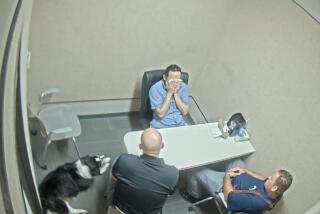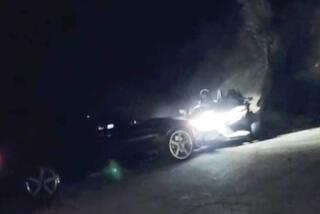Final Arguments Heard in Patrolman’s Murder Trial
- Share via
SAN DIEGO — Former California Highway Patrol Officer Craig Peyer’s practice of pulling young women over on a darkened freeway off-ramp turned to murder on the night he met Cara Knott, a prosecutor said in final arguments Tuesday.
Deputy Dist. Atty. Joe Van Orshoven told the San Diego County Superior Court jury that Peyer’s practice of pulling women over on the Mercy Road exit of Interstate 15 was a course of conduct waiting to explode into violence.
“We know that Craig Allen Peyer had a custom, a habit, a practice,” Van Orshoven said of the traffic stops.
Van Orshoven discussed that night of Dec. 27, 1986, when Knott died, saying, “But something went wrong. She wasn’t like these other youngsters.”
“She took particular care for her own safety,” the prosecutor said, mentioning the victim’s self-defense courses. She became anxious, felt she couldn’t escape and scratched her assailant’s face, he said.
A family photo showing a vivacious Knott was displayed, and then Van Orshoven showed the jury three coroner’s photos of the dead woman, with strangulation marks on her neck and bruises on her face.
In his final arguments, defense attorney Robert Grimes tried to poke holes in the testimony offered by the women motorists who said that Peyer detained them for protracted conversation during stops.
“Some of them were dead wrong in what they said,” Grimes told jurors.
The trial of Peyer, 37, of Poway began Jan. 19 in Superior Court.
Knott’s body was found the day after her murder at the bottom of a 65-foot bridge on a frontage road on Interstate 15, the highway Peyer was assigned to patrol the night of the killing. Peyer, a 13-year CHP veteran, was arrested 18 days later.
Last week, during a preliminary discussion of jury instructions, Grimes told Judge Richard Huffman that he may suggest in his closing arguments that Peyer may have been provoked into killing Knott.
The lawyer, who maintains his client never had any contact with the El Cajon woman, said he will suggest to jurors that if they find Peyer guilty of a crime it is voluntary manslaughter.
Peyer, who is free on $1-million bond, was fired by the CHP in May after an internal investigation concluded that he unjustifiably killed Knott. He is appealing his termination.
The prosecution’s case largely rests on such circumstantial evidence as blood samples, microscopic fibers and testimony of witnesses about Peyer’s behavior during prior traffic stops and his comments to colleagues.
Twenty-two women testified that they had been pulled over by Peyer at the same off-ramp and detained for what CHP officials said were unreasonable periods of time.
More to Read
Sign up for Essential California
The most important California stories and recommendations in your inbox every morning.
You may occasionally receive promotional content from the Los Angeles Times.













